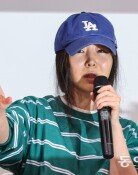‘Blacklist’ constitutes suppression of culture by those in power
‘Blacklist’ constitutes suppression of culture by those in power
Posted December. 28, 2016 07:06,
Updated December. 28, 2016 07:15
Evidence of a "blacklist of figures in the culture community," over which suspicions were repeatedly raised thus far, has been revealed. According to a report by The Dong-A Ilbo, the investigation team lead by independent council Park Young-soo found part of a list, which the senior presidential secretary for political affairs’ office had drafted at the instruction of former presidential chief of staff Kim Ki-choon and the Culture, Sports and Tourism Ministry managed, and discovered evidence that Choi Soon-sil was behind the list. The investigation team thus believes that Choi sought to funnel budget that would otherwise go to those on the blacklist to her own projects. In a radio interview on Tuesday, former Culture, Sports and Tourism Minister Yoo Jin-ryong said, “I saw a blacklist in person in June 2014, just before my retirement.” Cho Yoon-sun, who was appointed as the culture minister in early September this year, said she never saw a blacklist, but whether it existed or not will be verified by the independent counsel team.
Confirming a blacklist reminds us of the Yushin (revitalizing reform) regime dictatorship, which monitored and oppressed people in the culture community in the 1970s. The blacklist, which was first revealed through media reports in October this year, enlisted 9,473 people including supporters of then candidate Moon Jae-in at the time of the last presidential election, and supporters of then Seoul Mayor candidate Park Won-soon. The list reportedly contained nearly 10,000 people, also including those who were critical of the incumbent government’s response to the Sewol ferry disaster, which is ridiculous at best.
Lying behind the revival of a cultural blacklist, which has effectively reversed the historical clock back to the Yushin era, is apparently former presidential chief of staff Kim Ki-choon. In a media interview, former Minister Yoo said, “If we logically suspect, chief of staff Kim Ki-choon would have spearheaded drafting of the blacklist,” adding, “Whether it was actually the president’s intention or Kim’s own act should be identified by the independent counsel." In the memoir of the late Kim Yeong-han, who was presidential secretary for civil affairs, chief of staff Kim Ki-choon also reportedly told his presidential office staff that the government should aggressively respond to plots and acts by left-leaning people in the culture and art community. This is clear evidence that chief of staff Kim, who was a famed "anti-communist" prosecutor, is still obsessed with anachronistic way of thinking.
The government should reconsider providing taxpayers’ money to support creation of artworks that revealed overly excessive political bias, such as "Sewol, Owol" by Hong Seong-dam, which caused a stir at the 2014 Gwangju Biennale. During the Roh Moo-hyun administration, the government widely subsidized left-leaning people in the culture and art community who were supportive of the administration, while discriminating artists following conservative ideology and stance. Regardless of whether people are right leaning or left leaning, the government’s attempt to sway the culture and art community and control cultural figures and artists is never desirable. People in power should always keep in mind that any acts that dampen the diversity of culture and restrict artists’ activities will cause to retrogress to an authoritarian regime.
mskoh119@donga.com







